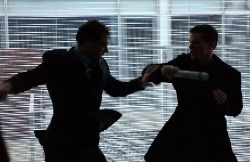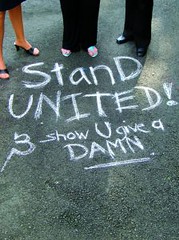I must say that the pending civil unions bill has brought every bigot out of their closet.
From the
members of parliament who feel they cannot approve it (despite a constitutional court interdict), to the verious members of the various churches, to
Jacob Zuma, to
Jon Qwelane, to
The Marriage Alliance.
This is not a South African issue. The gay marriage debate has raged all over the world and surprisingly few countries recognise gay marriage. In many countries is it still illegal to be gay.
What is a bigot?
Merriam-Webster defines it as:
Main Entry: big·ot
Pronunciation: 'bi-g&t
Function: noun
Etymology: French, hypocrite, bigot
: a person obstinately or intolerantly devoted to his or her own opinions and prejudices; especially : one who regards or treats the members of a group (as a racial or ethnic group) with hatred and intolerance
- big·ot·ed /-g&-t&d/ adjective
- big·ot·ed·ly adverb All the people and groups mentioned above qualify.
It is surprising that the issue has drawn such heat in a country as open as South Africa (we have come a long way since 1994!) The attitude seems to be one of, "If you keep it in your bedroom and never confront me with it, I'll ignore it."
Which again is amazing. I mean, when Pieter Dirk-Uys had a massively public fight with his boyfriend in the town of Darling (don't you just love the aptness of the location, daaahling? For those who don't know, Darling is a small, very Afrikaans farming town in the Western Cape), the whole town had an interest. After all, not only was he their most famous gay resident, he was their most famous resident! I wonder how they feel about gay marriage?
Now this is no argument for Gay Pride. Give me a break. I find the thought as redundant as Black Conciousness (although, more on this soon in another post - I understand the need for prejudiced groups to understand the prejudice, who they are and to fight prejudice, but
pride?) Kissing your gay boyfriend or girlfriend in front of someone because it makes them uncomfortable is provocative and unlikely to win them over.
But back to gay marriage. Just read this
Jon Qwelane claptrap: "It's unnatural," "I like homosexuals," " I would condemn and disown [my offspring] if they turned out to be homosexuals."
"I like homosexuals?" - that sounds like, "I have many black friends." How do you usually respond to that Mr Qwelane?
And then there was the out and out hate speech by
Jacob Zuma: "When I was growing up an ungqingili (a gay) would not have stood in front of me. I would knock him out."
The Sowetan quoted Zuma as saying that same-sex marriages were "a disgrace to the nation and to God."
Which brings us to perhaps the crux of the matter. Religion. Many if not most of the groups protesting gay marriages do so at least partly on religious grounds. People seem to forget both the idea of seculism and the Christian requirement to treat the Bible as a book of rules for them as an individual - "For in the same way you judge others, you will be judged, and with the measure you use, it will be measured to you. Why do you look at the speck of sawdust in your brother's eye and pay no attention to the plank in your own eye? How can you say to your brother, Let me take the speck out of your eye when all the time there is a plank in your own eye? You hypocrite, first take the plank out of your own eye, and then you will see clearly to remove the speck from your brother's eye." (Matthew 7:2-5)
Jesus demonstrated love for all mankind, Christian or not. He loved those of other religions, Jews who did not recognise him as the son of God and spent time with undesirables such as lepers.
Yes the Bible is clear on homosexuality (Leviticus 18:22 - even though there
remains much debate). That remains a homosexual person's issue to deal with should he/she consider Christianity, and not for his fellow Christian to stand in judgement of him.
The same would apply to any part of Christianity or any other religion as it applies to those who do not follow their religion. Must Islam be outlawed because it is not Christian, or vice versa?
Which comes to law. Should law be the popular view? I wonder. I wonder if the measure of good law is that it prevents someone from doing you harm and protects your rights. On that measure, it is difficult to argue against the civil unions bill. It proposes nothing to harm Christian, Moslems or anybody and their beliefs.
What Christians and other religions might argue is the right of a Church or priest to refuse to marry them. Hey, I hear them on this one. In any case, why would you want a religious ceremony for a religion that condemns your actions?
There may be one good thing coming out of this. It seems that Jacob Zuma's supporters could accept possible corrupt dealings on his part. They could accept his regard for a woman's dress as a sexual invitation. But, if the papers are to be believed,
they might not be able to accept his homophobia.
Maybe we're making progress after all.











 There is a saying that the price of freedom is eternal vigilism. That wise old guy Plato also once said that the price of apathy towards public affairs is to be ruled by evil men.
There is a saying that the price of freedom is eternal vigilism. That wise old guy Plato also once said that the price of apathy towards public affairs is to be ruled by evil men.



